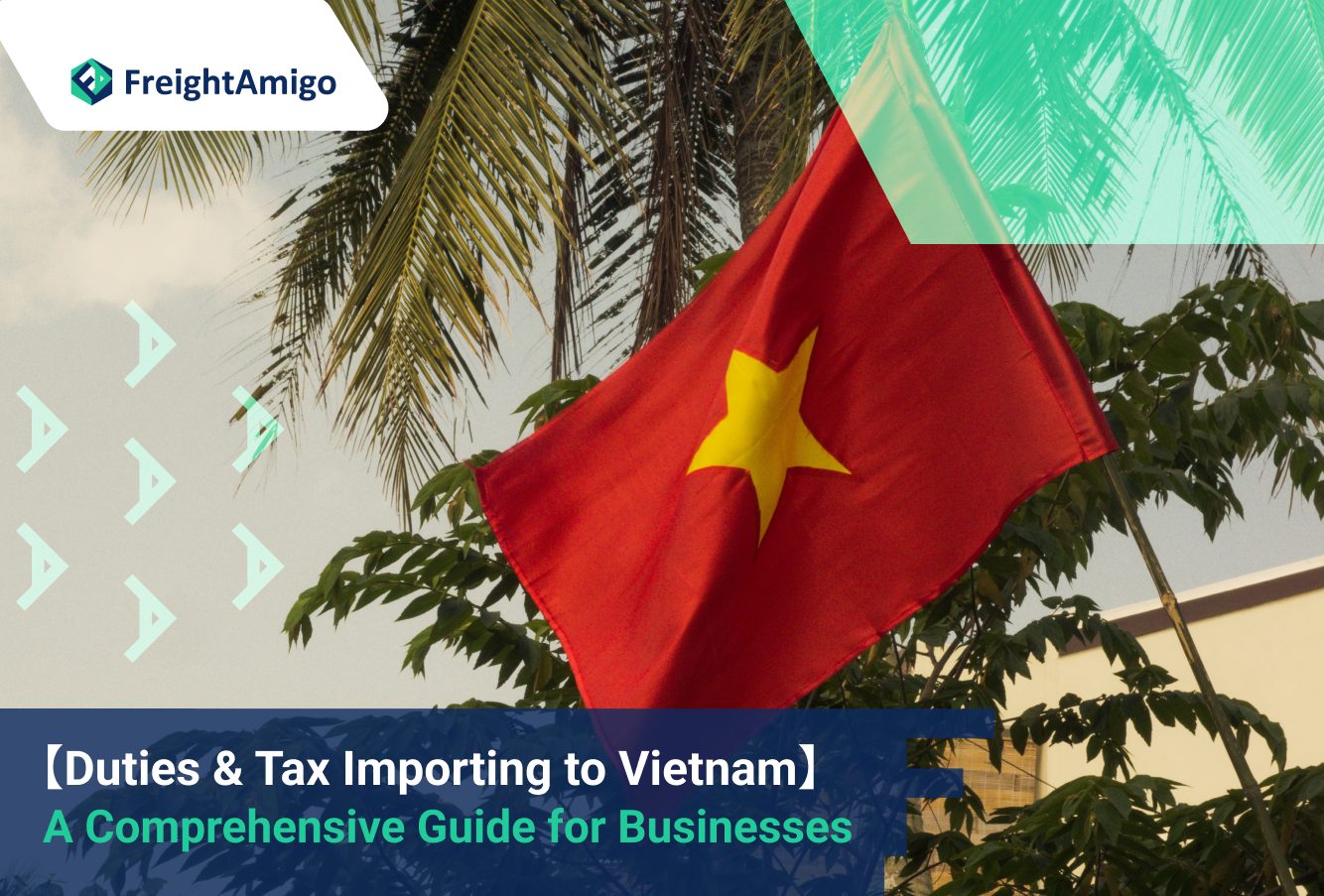Vietnam has emerged as one of the fastest-growing economies in Southeast Asia, with a thriving import market valued at over US$330 billion. However, to protect domestic industries and regulate the flow of goods, Vietnam imposes import duties on most products. It is crucial for businesses intending to export goods to Vietnam to understand how import duties and taxes are implemented by Vietnamese authorities. In this comprehensive guide, we will explore Vietnam’s import tax rates, types of import tariffs, the procedure for obtaining an import license, applicable taxes, and exemptions, providing businesses with the necessary knowledge to navigate the complexities of importing to Vietnam.
Latest update on 20 February, 2024 by Caspian Ng– Marketing Analyst at FreightAmigo
Want to compare the best Express, Air Freight, Sea Freight, Rail Freight & Trucking rates so as to have better control on cost?
Understanding Vietnam’s Import Tax Rates
Vietnam’s custom tariff system consists of two components: import duty and value-added tax (VAT). The import duty is a flat rate applied to all imported goods, while the VAT is a percentage-based tax imposed on specific regulated goods. The import tax rates vary depending on the type of product and whether it qualifies for preferential treatment. Luxury goods such as cars and perfumes generally attract higher tariffs, whereas machinery and non-domestic consumer goods are subject to lower import tariffs. Failure to pay import taxes may result in clearance delays at customs.
Vietnam’s import duty rates are categorized as follows:
- Preferential tariff rates:These rates apply to goods from countries that enjoy Most-Favored-Nation (MFN) treatment in their trade relations with Vietnam.
- Special preferential tariff rates:Goods imported from countries with a Free Trade Agreement (FTA) with Vietnam, such as ASEAN nations, enjoy special preferential tariff rates.
- Ordinary tariff rates:This category includes products that do not qualify for Vietnam’s MFN import duty treatment.
It is important to note that Vietnam has several free trade agreements (FTAs) with different nations, which may reduce or eliminate certain export and import duties. However, some taxes and fees may still apply even with FTAs.
Vietnam Customs Threshold
Vietnam has a de minimis value of VND1 million, below which no duties and taxes are levied on imports. If the value of your shipment exceeds the de minimis value, you will be required to pay duties and taxes. The amount of duties and taxes depends on the value of your shipment and the type of goods being imported.
Procedure for Obtaining an Import License in Vietnam
Importing goods into Vietnam requires an import license issued by the relevant Vietnamese government authorities. The process for obtaining an import license typically involves the following steps:
- Determine if the product requires an import license:Certain products may require specific licenses before they can be imported into Vietnam. Consult the Vietnam Customs website or contact the Ministry of Industry and Trade to determine if your product requires a license.
- Obtain a business license:To import goods into Vietnam, you must have a registered business in Vietnam with a valid business license.
- Register for an import-export code:Register for an import-export code (IEC) with the Ministry of Industry and Trade. This code identifies your business when importing or exporting goods.
- Apply to relevant government organizations:Apply to the appropriate government organization for an import license. The application will typically require details about the product’s type, volume, and source.
- Pay import-related fees:Depending on the imported item, you may be required to pay various import-related fines and tariffs.
- Obtain approval:After submitting the application and paying the necessary fees, you will be notified whether the request has been granted or declined.
- Obtain the import license:If your application is approved, you will receive an import license that allows you to legally import the specified commodity into Vietnam.
It is advisable to seek guidance from a customs broker or legal representative to ensure compliance with the specific requirements for obtaining an import license in Vietnam.
Taxes Applicable to Imports into Vietnam
When importing goods into Vietnam, various taxes and fees may apply. These levies are imposed by the Vietnamese government to generate revenue and protect domestic industries from foreign competition. The taxes applicable to imports into Vietnam include:
- Import Duty: This tax is levied on the value of imported goods. The tariff rate depends on the nature of the products and their country of origin.
- Value-Added Tax (VAT): In addition to import duties, VAT is applied to the value of imported goods. Vietnam’s VAT rates for imported goods range from 0% to 10%, with certain exemptions for goods that cannot be produced domestically.
- Environmental Protection Tax (EPT): Goods that are deemed to have a harmful effect on human well-being or the environment are subject to EPT. Examples include coal, gasoline, and plastic bags.
- Special Consumption Tax (SCT): Also known as “luxury tax,” SCT is levied on products such as tobacco, alcohol, automobiles, motorcycles, air conditioners, and petroleum products. The SCT rates vary depending on the type of product.
It is essential to be aware that Vietnam has multiple free trade agreements (FTAs) with different countries, which may reduce or eliminate certain export and import duties. However, even with FTAs, some taxes and fees may still be applicable.
The Formula for Calculating Import Tax Duty in Vietnam
In Vietnam, the following formula is used to calculate import tax duties:
Import Tax Duties = Import tax + Value-Added Tax (if any) + Special Consumption Tax (if any) + Environmental Protection Tax (if any)
Special Sales Tax and Environmental Protection Tax are applied to specific products in addition to import duties. VAT is applied to all imported goods and services. Each import tax duty is calculated by applying a tax rate to the new value base, which includes the import value and all previous tax duties. The order of taxation is as follows: import tax, special consumption tax, environmental protection tax, and value-added tax.
Exemptions from Import Tax in Vietnam
Vietnam offers special import tax deductions for the following cases:
- Items imported under particular conditions
- Imported goods for private purposes
- Supplies used for the production of export products
- Goods imported for further processing and processed exports
- Goods temporarily imported for re-exports within a specific period
- Goods traded among border residents
- Supplies that cannot be domestically produced
- Non-commercial goods (samples, advertisement publications in small quantities)
- Investment projects
These exemptions aim to support specific situations and industries while promoting trade and economic development. It is crucial to familiarize yourself with the list of prohibited products to avoid penalties and legal consequences.
List of Prohibited Products for Import into Vietnam
Vietnam has a list of goods that are strictly prohibited from being imported under any circumstances. Some of the prohibited items include weapons, banned recordings (tapes/discs), explosives, hazardous materials, illicit substances, fake items, second-hand items, and chemicals listed as banned. These restrictions are in place to protect public health, the environment, and combat illicit activities. Importers should carefully review the list of prohibited items to ensure compliance with the law and avoid penalties.
Conclusion
In conclusion, understanding Vietnam’s import tax regulations is crucial for businesses looking to import goods into the country. With a comprehensive understanding of Vietnam’s import tax rates, types of import tariffs, the procedure for obtaining an import license, applicable taxes, and exemptions, businesses can navigate the complexities of importing to Vietnam successfully. Seeking guidance from reputable import/export companies, customs brokers, or legal representatives is highly recommended to ensure compliance with all relevant laws and regulations. Vietnam’s evolving trade landscape presents opportunities for growth and expansion, and by staying informed and adaptable, businesses can capitalize on the country’s vibrant import market.
There are different options for cargo transportation. If you want to choose the most convenient and suitable solution, it is best to have the full support of logistics experts! If you are planning to transform your warehouse operations, please go to the FreightAmigo page for inquiries.
Read More:
Shipping from Hong Kong to Vietnam | FreightAmigo
Maximizing Profits | Fulfillment by Amazon Products Revolutionizing Your Business | FreightAmigo
The Art of Order Fulfillment | Strategies for Success in an E-commerce World | FreightAmigo
Maximizing Efficiency | Crucial Role of Fulfillment Services | FreightAmigo
If you have any inquiries on logistics/supply chain, feel free to contact FreightAmigo now:
Chat with us online | Hotline: +852 28121686 | WhatsApp: +852 27467829









































